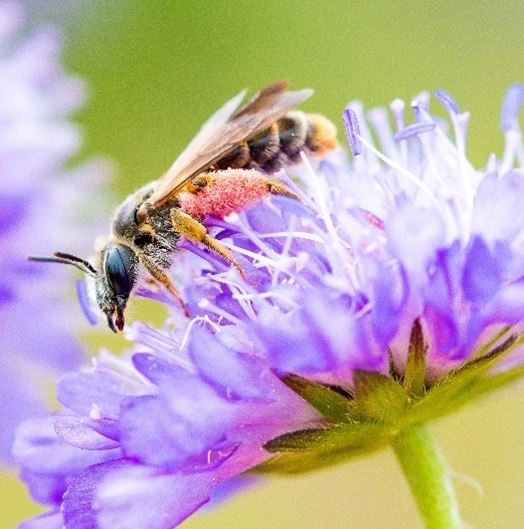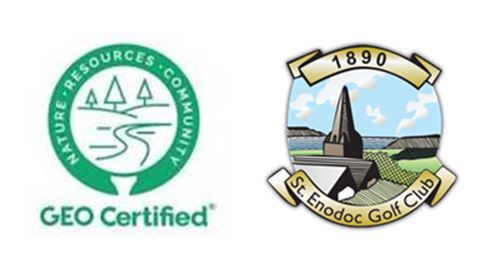St Enodoc Golf Club in North Cornwall has been awarded the prestigious and internationally-recognised GEO Certification in acknowledgement of a number of years of work in meeting the rigorous requirements set out in the GEO standard.
The club is delighted that this global accolade recognises the outstanding work that took root over 10 years ago by the course management team and clubhouse staff. Indeed this certification is just part of an ongoing commitment by St Enodoc that continually strives for excellence in sustainable golf.
“The verification process confirms that St Enodoc Golf Club satisfies all the GEO Certification criteria. The comprehensive GEO On Course report provides solid evidence of the continued commitment by the Club to maintain wider sustainability issues, proving we are meeting the stringent certification standard. St Enodoc is rightly proud to have the GEO verification and is delighted that this national accolade recognises in particular the outstanding work of the Course Manager, Scott Gibson, and all his green-keeping staff in terms of ecology and environment,” comments General Manager, Simon Greatorex.
In terms of nature, the club has taken its role as custodian of the land on which the course lies very seriously and is committed to fostering nature. This is clearly demonstrated, for example, by the work carried out over the last decade with Natural England and the club’s implementation of a Countryside Enhancement Scheme (CES) for a Rock Dune Site of Special Scientific Interest.
Separately, the Club is also investing in a range of measures to protect and restore the sand dunes which have become subject to erosion, aiming to retain and extend this Priority Habitat.
Most recently, work has focused on the treatment of invasive species including three species of cotoneaster which were colonising and reducing the value of areas of sand dune, the creation dune hollows, ongoing management of previously-cleared scrub and the establishment of a strong population of Babington’s Leek.

The club also works closely with Buglife, an organisation dedicated to creating 20 hectares of flower-rich habitat along the North Cornwall coast to help a variety of threatened bee species. St Enodoc has a number of areas of rough around the course that are key sites for the threatened Large Scabious Mining Bee (pictured) so, as part of the Buglife plan, the greenkeeping staff have made a considerable effort to manage this habitat to ensure it is rich in Field Scabious which these bees feed on and so to help to protect them.
Conserving resources such as water and energy is also important to the club, which believes in a wider responsibility to ensure it is using as little as possible and to try to be self-sufficient. A recent example of this is the upgrade of sprinkler heads to adjustable/part arc array which has made a substantial saving in water usage on the fairways. Moreover, over the last four years, a programme of overseeding the greens with Fescue grass in order to change their profile and make them more drought tolerant, as well as requiring less fertilisation, has been implemented.
Similarly, the north Cornish club takes its environmental impact very seriously and has taken several measures to reduce its carbon footprint in and around the course whilst at the same time reducing its use of fossil fuels through the investment of further solar technology to increase its renewable energy capacity and a machinery and buggy plan to replace petrol and diesel vehicles with modern hybrid/electric options.
In order to become better neighbours, the club has created events that encourage members of the local community to interact with the club and course. This is evidenced by hosting habitat walks with local environmental experts and supporting local businesses and clubs with their activities.
“St Enodoc Golf Club shows substantial management commitment, plans, surveys and practices for more responsible and sustainable golf. Highlights include the conservation of bees, Daymer Bay dunes S.S.S.I. conservation and detailed digital habitat maps to inform, plan and manage a variety of habitats,” notes Dino Minoli, GEO accredited independent verifier.
“Other sustainable practices include LED installations and energy-efficient appliances, solar panels, natural lighting, branded reusable water bottles, water drinking stations, sustainable procurement and catering, no single use plastic, material recycling, safeguarding policies, charitable support and community volunteering.”
GEO Certification is assured by GEO Foundation, the not-for-profit organisation dedicated to delivering programmes that help people on the ground to evaluate, improve and credibly communicate their sustainability work across the agenda of nature, resources, community and climate action.
GEO Certified is the symbol of a great golf environment, confirming that St Enodoc Golf Club satisfies all GEO certification criteria; meeting a credible standard in the areas of nature, resources and community, and is committed to continual improvement. The comprehensive Certification Report provides a detailed account of the continued commitment made to maintain wider sustainability issues.
For more information visit www.st-enodoc.co.uk and https://sustainable.golf/courses/

